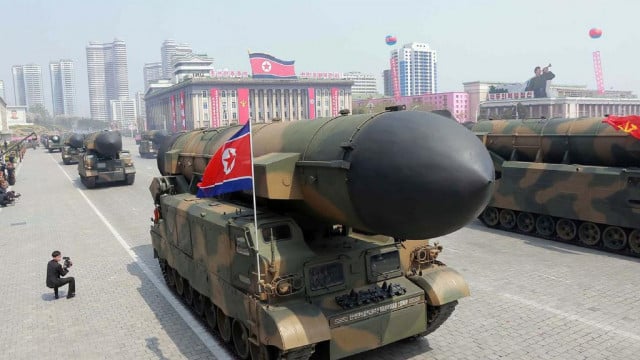Addressing the North Korean Nuclear Crisis from a Youth Perspective

- Seang Bou Chea
- January 21, 2021 11:21 AM
The North Korean nuclear crisis has been threatening international peace for decades despite considerable efforts from the international community regarding denuclearization. North Korea began its nuclear program during the Kim Il Sung regime in the early 1980s.
The international community has tried to deal with the crisis diplomatically, yet the negotiations frequently failed. The failures are mostly due to North Korea’s unwillingness to adhere to the terms and conditions of denuclearization.
For example, in 2003, the Pyongyang government exited the Non-Proliferation Treaty and publicly announced that it would reactivate its nuclear plant. In 2006, North Korea had its first nuclear test, and between 2013 and 2016, Kim Jung Un, North Korea’s current leader, carried out a series of nuclear tests. Although the United States has been exercising “strategic patience” toward North Korea, the denuclearization process is still a major concern for both the Korean Peninsula and the wider Asia-Pacific region. To effectively address this crisis, two new initiatives should be implemented: a major United Nations (UN) reform and a transformation of North Korea.
North Korea’s nuclear activities have drawn sanctions from the UN, but the sanctions could not solve the nuclear crisis. There are nine United Nations Security Council’s resolutions that have been made on North Korea between 2006 and 2017. However, the principal sanctions of resolutions 1718, 1874 and 2094 have been violated by China. Those three resolutions state that all member states are prohibited public financial support for trade that can contribute to nuclear development; are prohibited from direct or indirect supply of weapon to North Korea; and inspect and detain any suspected cargo or shipments containing nuclear-related materials to or from North Korea (Philipp, 2018).
According to a UN panel, there were trade in coal and oil products between China and North Korea in 2019 as the satellite showed M/V Kwang Myong ship-to-ship transfer of coal near the Lianyungang port in China. Moreover, in 2018, there were 47 shipments from May to August reaching Hangzhou port near Shanghai. In terms of armed sale, North Korea firms were still able to purchase firing systems from China, according to the London Telegraph’s 2012 report. Furthermore, Chinese banks in Dandong were secretly helping a woman transferring the money between Chinese and North Korean bank accounts. However, since China has veto power at its disposal, any sanctions, punishments, or resolutions on North Korea may not be easily adopted or passed. China’s assistance has helped North Korea to overcome the sanctions placed on it.
To improve the effectiveness of the sanctions, the United Nations need to be reformed. Under the current veto system, the five permanent members (P5) have abused their power. Although P5 is the world police, in reality, they mainly serve their interests. For example, China will never give up North Korea since it views the latter as a buffer state. In an anarchic world, China no doubt has to secretly support the survival of Kim’s family without much consideration of world peace and security.
The United Nations Security Council should remove the veto system and allow other regional representatives to be part of permanent members since the current UN model is only reflecting the post-World War II word. Therefore, any decisions should follow the majority votes among many new permanent members rather than powerful countries’ interest. The removal of the veto system will restrict China and potentially Russia from supporting North Korea. Any sanctions and resolutions will be easily adopted and made more effective.
Another way is to open up the gates for North Korea. The old tough methods such as economic sanctions have already failed as the Kim Jung Un regime seems to remain stable. The international community should contrastively take steps to push North Korea toward prosperity since it is impossible to remove its nuclear weapons. Moreover, although the country may eventually agree to abandon its nuclear ambitions, the crisis could occur anytime since the nuclear development resources are still there in the country. Apparently, North Korea’s nuclear program is more likely built on the basis of self-defense and survival rather than on aggressive actions. The Kim family may have suffered from suspicion and fear that the United States would take down the Kim regime, and they may be of the belief that only nuclear weapons can ensure their survival. Therefore, instead of forcing North Korea by imposing sanctions, which makes it even more isolated, the world, especially the US, should make a deal to convince North Korea to stop its nuclear program by guaranteeing the safety and survival of the Kim regime and allowing the country to join the international community.
China can serve as a good example. Its opening up to international cooperation with Western countries has made China become a dragon that has just woken up. China joined the World Bank in 1980 and the World Trade Organization in 2001. Its fast economic growth has pulled it out of poverty, making the Chinese Communist Party switch from military-based to economic-based survival model. North Koreans are under poverty. Once the country is open to international trade with the rest of the world, it will enjoy the great taste of economic prosperity and good living standard.
The regime will possibly focus more on economic development rather than on nuclear weapon proliferation. Moreover, since North Korea has successfully controlled its own citizens, if the regime can make everyone have better living conditions or can ensure prospects for a better living standard, the citizens will most likely support the current government’s decisions, as well as the engagement initiatives by the international community. Therefore, the world should target the core of the issue, which is to integrate North Korea in a similar way it did with China.
However, there are still obstacles to the aforementioned solutions. Firstly, the removal of the veto system will not be approved by the P5 since these powerful countries do not want to give up their power easily. Secondly, there were evidences that the US miscalculated China. The US hoped China would respect human rights, freedom of expression, and democracy more than before once it would experience capitalism and prosperity.
Yet, in reality, the Chinese government now seems to be even more authoritarian than before. Thirdly, North Korea is ruled by the Kim family rather than a group of people like the Chinese Communist Party. This means Kim Jung Un may only care about his regime and power, not the North Korean people nor the economy. Despite these barriers, the two solutions mentioned earlier may be the only solutions that would work as they have not been implemented yet. They should be explored as viable options to address the North Korea’s nuclear crisis as the old strategies have failed for decades.
Seang Bou Chea is a sophomore in International Studies and a junior in Chinese literature at the Institute of Foreign Languages, Royal University of Phnom Penh.















